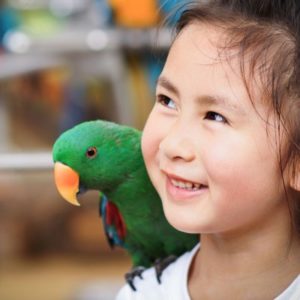Did you know that November 6-12th is Bird Health Awareness Week? Our fine feathered friends may very charming and adorable little pets. Birds are quite fragile, however, and have some very different needs than dogs and cats. Here, a local Fayetteville, NC veterinarian offers some tips on keeping pet birds healthy and happy.
Birdproofing
Make your home safe for Polly by doing some basic birdproofing. Remove or secure toxic plants; wires and cords; and any small or breakable items. Fans; windows and mirrors; and open water can also be very dangerous to your colorful little pet. Since birds have very sensitive lungs, it’s also important to make sure your feathered buddy isn’t exposed to harmful fumes, like cigarette smoke or cooking fumes.
Playtime
Most of our feathered friends need at least a few hours out of their cages every day. Be sure to give Polly the free time she needs.
Comfy Cage
Make sure that Polly is comfortable and happy in her cage is very important! Get the biggest and best birdcage you can. Since this is a one-time cost, it’s definitely something to splurge on.
Breed Research
Different types of birds have slightly different needs. For instance, finches need sunlight to stay healthy, while parrots require lots of toys. Ask your vet for specific recommendations.
Food
Proper nutrition is very important! Follow your vet’s recommendations for Polly’s dietary needs.
Stimulation
Living in a cage can get quite dull. Provide Polly with a variety of suitable playthings, such as ropes, swings, ladders, and other toys. Change your cute pet’s toys out regularly, so she doesn’t get bored with them. Ask your vet for specific advice, including suggestions on safe toys.
Veterinary Care
Ask your vet to recommend an appointment schedule for your feathered pal. Polly will need regular exams. Your vet may also recommend wing clipping. While you’re there, get some professional recommendations for your bird’s diet, care, and entertainment needs.
Warning Signs
Polly can get very sick very quickly, so it’s important to address any potential health issues right away. Some signs of illness in birds include stiffness; disorientation; head bobbing; lethargy; and feather plucking. You’ll also want to watch for changes in your cute pet’s waste, appetite, vocalizations, or behavior. Ask your vet for more information.
Do you have questions about caring for your pet bird? Contact us, your Fayetteville, NC animal hospital!





